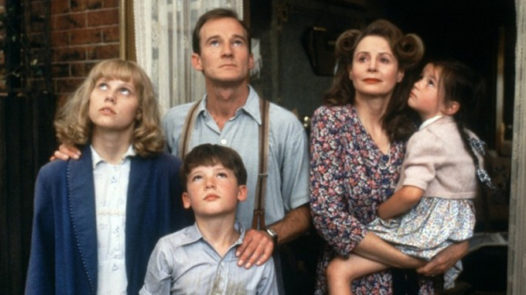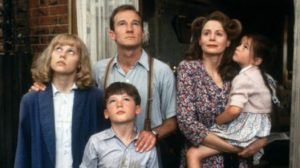Grading Historical Movies: John Boorman’s “Hope and Glory” (1987)


Note: Students in Stephen Norris’s HST/FST 252, History at the Movies, are grading historical films and offering reviews on how assigned films render the past. The eighth film assigned in this Fall 2018 version of the course, which focuses on European films about World War II, was John Boorman’s 1987 Hope and Glory.
Overall grade from 45 students: B+
Review One
By Stephan Koclejda
Grade: A
Hope and Glory (1987) is a spectacular British comedy about family, boyhood, and the Blitz. Drawing from the personal experiences of director John Boorman, the film captures the Second World War and subverts its myths through the eyes of an 8-year-old boy living in London during the Blitz.
The film follows Billy Rohan and his family, as the war pushes them into the new ways of life on the British home front. His family deals with the occasional German bombing of their street as he goes to school, his teenage sister Dawn sneaks out to party, his dad enlists to recapture his glory days, and his mom left behind to take care of them all. For the Rohans the war soon becomes just another facet of life, tertiary to their lives, as such was the experience for the United Kingdom throughout the course of the war. The British had a vastly different experience than the rest of Europe, and Hope and Glory is refreshing in its capture of it.
Throughout the film the various British myths and propaganda are debunked with comedic flair. The concept of family as a binding agent for society is subverted: while the Rohans are together and closer at the end of the film, it has its disfunctions and isn’t magically cohesive. Dawn has a sexual relationship with a Canadian soldier who eventually impregnates her and marries her (she’s 16, by the way). Billy’s mom doesn’t miss her husband very much while he’s working for the army and is able to share her true feelings with the family friend Mac who feels the same for her. The concept of family is shown in a real way that doesn’t hold true to propaganda.
In the context of Billy’s childhood, war is a grand time. Bombed out buildings provide a playground for him and the neighborhood boys, complete with semi-destroyed clubhouse and plenty of things to go and smash. Unlike Forbidden Games, Ivan’s Childhood, Germany, Pale Mother, or Come and See, innocence is never lost or ripped away by the war – it’s still fun and games for Billy. He sees destruction of his neighbors’ homes, sure, but an 8-year-old cannot fully understand why it’s not nice to go ask the girl down the street whose house was just bombed that night if her mom died in the blast (she did). Hope and Glory presents a child’s truth of war, one perhaps more real than the mythic one of the great British empire, with “everyone doing their bit”. Instead we are meant to rethink the British mythos of World War II, and even mock it a little bit.
Review Two
By Natalie Davis
Grade: B
Hope & Glory may seem initially like overly patriotic British propaganda. However, upon taking a closer look, it becomes a self-aware satirical view on British imperialism. This story follows one family: a husband who fights briefly in the war; a mother who is not in love with her husband, but with his best friend; a daughter who has a love affair with a Canadian soldier, a young boy fascinated by war, and a very small daughter. The main character in this film, Billy, is a young schoolboy who sees the war around him as something exciting, not scary. Throughout the war, Billy’s life does not change dramatically, but instead ends up helping him in small ways: he makes new friends, he grows closer with his father and grandfather, and last but not least his school gets burnt down so he doesn’t have to go to class.
This film seems patriotic upon first glance; in the end the family is stronger than ever and the main character is happier than he has ever been. However, after breaking down the movie, it holds a much deeper and meaningful portrayal of British citizens during World War II. Hope and Glory contrasts Billy’s innocence and naivety about the war by including older, more ambiguous characters. These characters, such as Billy’s grandfather and Billy’s teacher, are more knowledgeable about the war and support the growth of the British Empire. The film comically depicts these older characters as idiotic adults who are stuck in their own beliefs and cannot see the greater truth. These adult characters follow tradition British values: they do their ‘bit’ in war and assume others to do the same. On the other hand, the Billy and most of his family do not do their ‘bit’, they make selfish choices in the war and they are ultimately the happiest. Hope and Glory supports the notion that being a good, supportive citizen to your country is not necessary. Instead of regurgitating the government’s ideals, one should look at everything through a child’s eyes. People should see the world innocently, logically, and do what they fell is right. Hope and Glory is ultimately quite an ironic name for this movie, because it is does not support typical British ideals.
Review Three
By Jill Teitelbaum
Grade: C
Released in 1987, Hope and Glory portrays an imperfect British family whose seemingly ridiculous experience of WWII successfully serves as a critique of the increasingly obsolete and hypocritical old imperialist Britain as well as the myth of a united and austere war effort. The story is told through the lens of a naive British boy, Billy. He lives with his ungrateful mother, daft father, promiscuous older sister and unnoteworthy baby sister.
The opening scene of the movie sets the tone when it shows school children running around chaotically while an official government message warns about the imminent war. Their attention is only regained when the Western film that had been interrupted for the message resumes. According to Billy, when the war was finally declared, “everyone said ‘Fancy starting a war on such a beautiful day.’” Shortly thereafter, Billy’s father is deployed and throughout the film the family dynamic shifts as the war progresses. His mother is unfazed by her husband’s absence and we later learn that she still has feelings for her former flame, Mac. Her happy marriage, like many other things in the movie, turns out to be more of an act than anything. The community enjoys the idea of British patriotism more than living it. Everyone was expected to do their part to support the war effort and defend the “pink bits,” however they were less keen on making the necessary sacrifices. Instead, they went through the motions of being patriotic without internalizing genuine austerity and selflessness.
Billy’s urban middle-class neighborhood is bombed, burned and even visited by an ejected German soldier. Despite the serious implications of these events, the neighborhood continues to foster an unbothered and self-interested lifestyle. For example, Grace has a romantic picnic on the beach with Mac. With anti-watercraft obstacles and barbed wire in the background, the two of them reminisce about their past. The contrast between their environment and their conversation is comical. There were many examples of this frivolous attitude throughout the movie. Billy’s older sister is only concerned about having a good time. She sneaks out to party and initially rejects a marriage proposal from her Canadian lover claiming she doesn’t want to wait around for him. When Billy and his family leave the city to stay with his maternal grandparents, we meet his imperialist grandfather. The grandfather bemoans having had four daughters. His only perceived use for them was forming a string quartet. The grandfather also accuses his daughters of marrying deadbeats, meanwhile, he plays cricket and boats along the scenic river while other men are dying for their country. His hypocrisy and outdated beliefs represent the old British empire.
Overall, the adults in the movie are incapable of taking the war effort seriously and putting their country’s interests before their own. Similarly, the children struggle to grasp the gravity of the war. For example, at the very beginning, Billy laments, “I’m going to miss the whole war, and it’s all your fault!” This attitude was apparently unaffected by the experience of the war. In one of the final scenes, Billy’s school is bombed. In reaction to this, his schoolmate looks skyward and joyfully shouts, “Thank you, Adolf!” This tone-deaf remark captures the shared naivete and superficial patriotism of the Brits in this movie.